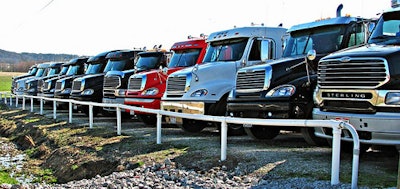
Washington constantly moves forward with regulations and changes for the trucking industry. Mandates requiring on board electronic records (EOBR) were blocked in an amendment, however, a Federal Motor Carrier Safety Administration (FMCSA) supported law will force truckers and distribution companies to assume more responsibility for their safety record on the nation’s highways. The bill was awaiting presidential signature as of July 6, 2012.
According to Blaze reporter Liz Klimas, the bill is controversial at best. Views about the benefits and necessity for the EOBR vary widely from the opinion that this is just another case of “Big Brother” to a genuine belief that the measures will provide safer roads and lower operating costs for the industry overall.
Changes for the trucking industry were tacked onto a massive federal highway package. According to Roadscholar.com, the $100 billion dollar bill calls for a review by FMCSA of the new HOS requirements poised to go into effect in 2013. Specifically, a study will be completed to review the effectiveness of the looming 34-hour restart provision. FMCSA has proposed these changes to address the growing problem of drivers on the road under the influence of not only alcohol and drugs, but also fatigue and stress.
The legislation will require employers to maintain an active testing program for new drivers and maintain records for compliance and refusal to be tested. Cooperation with third party testing and record keeping is part of the proposal. TruckingInfo also reported that the loopholes that drivers used in the past to avoid providing full employment histories that could reveal positive tests and drug abuse are being closed with the new changes.
With regard to maintaining accurate driver logs, the regulations aim to reduce driver fatigue by lowering the number of hours a driver can spend behind the wheel. Driver training and education have failed to reduce the number of highway accidents significantly in recent years. Insurance studies reveal distraction and fatigue are among the highest ranking reasons for crashes on the roadways. To address the issues, companies are turning to technology like EOBR's (electronic on board recorders) / smarter trucks and systems that allow them to monitor data, review that data and make changes to reduce stress and fatigue for drivers.
According to FMCSA research, as many as 20,000 people are injured each year due to driver fatigue in accidents involving big trucks. In addition, some 750 people will die from driver fatigue incidents. Installing EOBR technology will assist drivers and company executives assume responsibility for their safety record on the road. Companies taking an active part by providing the newest technology for drivers support the efforts to stay in compliance with less stress. Records that are updated in real-time eliminate human error related to remembering exactly what time the last stop happened.
Drivers avoid tickets and fines with extra features that notify them of approaching deadlines—alerting drivers to switch seats or plan a rest stop. Saving money with electronic on board recording is as easy as using GPS to find your best route. While business owners and drivers do not appreciate mandates that control where they go and how fast, there are advantages to using technology to monitor driving patterns.
Taking personal responsibility can lead to lower fuel prices, reductions in insurance coverage premiums, fewer accidents, less stress from chasing impossible delivery schedules and fighting unfriendly terrain. Business owners should find that the cost of installing the new equipment far outweighs any negative aspects of complying with the new regulations that were just passed through Congress.
Embracing change is not easy, but it can be financially rewarding if approached properly.
Grady Winston is an avid internet entrepreneur and guest blogger from Indianapolis. He has worked in the fields of technology, business, marketing, and advertising implementing multiple creative projects and solutions for a range of clients.


















